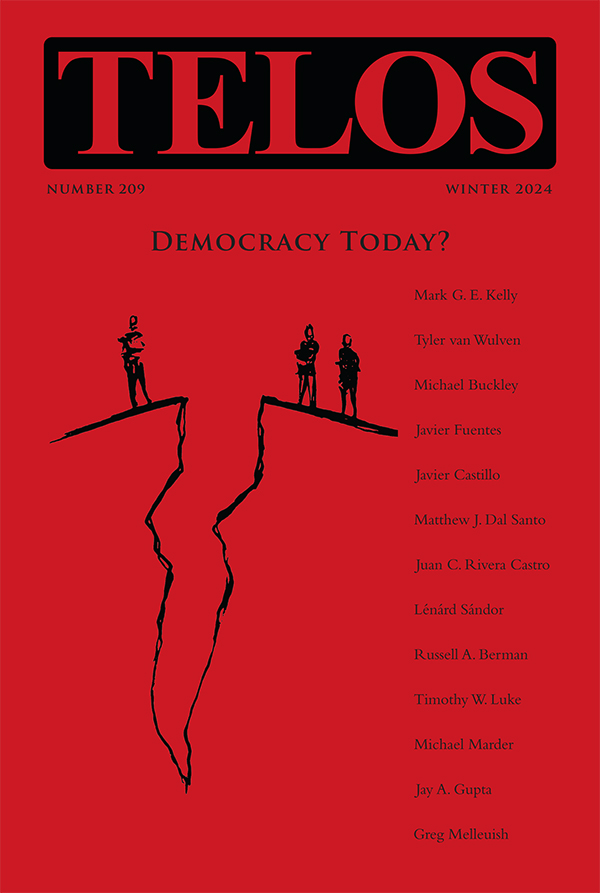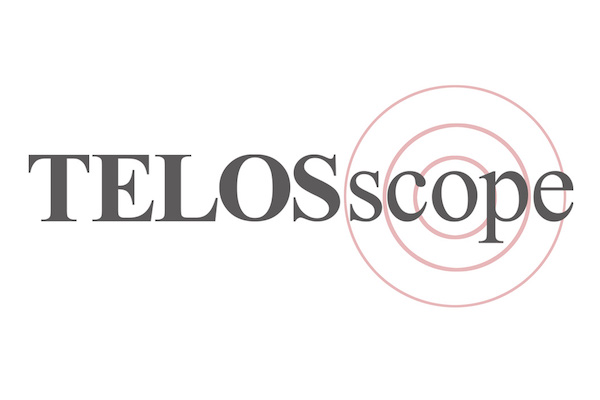By David Pan · Monday, January 6, 2025 Telos 209 (Winter 2024): Democracy Today? is now available for purchase in our store. Individual subscriptions to Telos are also available in both print and online formats.
 Since the supposed triumph of liberal democracy with the end of the Cold War, democracy seems now to be in retreat. The hung parliaments in France and Germany, reminiscent of the divides of Germany’s Weimar Republic; the just-in-time reversal of the declaration of martial law in South Korea; the increasing authoritarianism of China, Iran, and Russia; and the deterioration of democratic norms in the United States are all indications that the liberal democratic end of history was a chimera. Since the supposed triumph of liberal democracy with the end of the Cold War, democracy seems now to be in retreat. The hung parliaments in France and Germany, reminiscent of the divides of Germany’s Weimar Republic; the just-in-time reversal of the declaration of martial law in South Korea; the increasing authoritarianism of China, Iran, and Russia; and the deterioration of democratic norms in the United States are all indications that the liberal democratic end of history was a chimera.
What is the situation of democracy today? Are the present problems simply growing pains in the inevitable march of history, or are there fundamental limitations of this political form? Is democracy a stable form of government or a delicate balancing act that will always be at risk of deteriorating and being replaced by some form of authoritarianism?
These current indications of the precarity of democracy also coincide, however, with an intense concern for its future. Never has there been such a focus on democracy as a political goal. During the Cold War, the United States, more concerned about promoting capitalism than defending democracy, supported capitalist authoritarianism in places such as Chile, South Korea, and Taiwan. But as it turned out, capitalism did not really need such political backing. In the Cold War between capitalism and communism, the latter lost based on its inability to produce economic growth. Insofar as communism’s undermining of private property and market mechanisms proved to be economically catastrophic, even nominally communist governments in China and Vietnam have since voluntarily embraced capitalist economic policies. Aside from U.S. college campuses, the only diehard Marxists left are in Cuba, North Korea, and Venezuela, all of whose governments are presiding over the immiseration of their peoples.
While it was the Soviet Union, and not capitalism, that collapsed under the weight of its own contradictions, the general recognition of these contradictions meant that communism could only maintain itself by using repressive methods. Communism has been one of the surest ways of moving toward and cementing authoritarianism and totalitarianism. By contrast, capitalist authoritarianism has sometimes led to democratic reforms, and we can point again to Chile, South Korea, and Taiwan, but also to the countries of Eastern Europe, as successful transitioners to democracy within a capitalist framework. Unfortunately, while communism might correlate strongly with authoritarianism, the link between capitalism and democracy does not seem to be so tight.
Continue reading →
By Peshraw Mohammed · Wednesday, August 21, 2024 
The following essay originally appeared in German in Siebter Oktober Dreiundzwanzig: Antizionismus und Identitätspolitik, ed. Vojin Saša Vukadinović (Berlin: Querverlag, 2024), and appears here in English translation by permission of the author. Translated by Russell A. Berman.
 More than ever, leftists, political Islam, and postcolonial intellectuals have joined forces in an unholy alliance. Lacking an understanding of the history of Islamic expansionism, Arab colonialism, and Islamic antisemitism, parts of the Western left have come to regard any countermovement to the West as a fight against American imperialism. Therefore, the Islamic Republic of Iran and Islamist movements such as Hamas and Hezbollah are understood to be part of an anti-imperialist bloc. These tendencies were already observed in connection with the rise of the “Islamic State” (IS). When its terrorists attacked the Kurdish city of Kobanê, Kurdish militias fought IS in cooperation with U.S. forces. Some leftists in Germany, Britain, and the United States demanded that the United States stop its bombings. More than ever, leftists, political Islam, and postcolonial intellectuals have joined forces in an unholy alliance. Lacking an understanding of the history of Islamic expansionism, Arab colonialism, and Islamic antisemitism, parts of the Western left have come to regard any countermovement to the West as a fight against American imperialism. Therefore, the Islamic Republic of Iran and Islamist movements such as Hamas and Hezbollah are understood to be part of an anti-imperialist bloc. These tendencies were already observed in connection with the rise of the “Islamic State” (IS). When its terrorists attacked the Kurdish city of Kobanê, Kurdish militias fought IS in cooperation with U.S. forces. Some leftists in Germany, Britain, and the United States demanded that the United States stop its bombings.
What was the point of their demand? The United States carried out air strikes to support Kurdish ground troops in order to defeat Islamic terrorism. Failure to bomb IS positions would have resulted in IS conquering Kurdish areas in order to enslave or kill women and children. In the end, as in the case of the Yazidis, genocide could have been the outcome. The anti-Zionist cultural historian Hamid Dabashi compares the Kurds to the Jews and sees a prospective establishment of an independent Kurdistan as the “second settler-colonial Israel.”
The fixation of large parts of the left on the United States while simultaneously remaining indifferent to Russian, Chinese, Iranian, or Turkish imperialism has led to serious political misjudgments. This includes the idea that every form of Western thought, art, or literature is part of a colonial project. The works of progressive philosophers such as Rousseau, Hegel, Marx, Sartre, and even Frantz Fanon are now viewed as contributing to the reproduction of European white hegemony and are consequently rejected.
Continue reading at Telos Insights →
Continue reading →
By Christophe Guilluy · Wednesday, December 8, 2021 Christophe Guilluy is a geographer and observer of French society. Christopher Caldwell comments on his work here. This interview appeared in Le Figaro on November 21, 2021 and is translated with permission by Russell A. Berman, whose comments are here.
Q: Several months before the presidential election, how do you see the political situation in France?
Christophe Guilluy: Fundamentally nothing much has changed since 2017. I did an interview about the duel between Macron and Le Pen, which I described as a chemically pure cleavage: the popular classes against the professional upper classes, the metropolis against the periphery. None of that has changed at all. The core of Macron’s electoral support is still made up of the bourgeoisies of the right and the left, the boomers, the retirees, people fully integrated into society. And for a good reason: he is the only candidate who defends the economic and cultural model of the past twenty years. Therefore, the electorate willing to follow him is the one that is integrated into this model, that benefits from it or is protected by it, such as the retirees for example. Starting from that, he can count on a hypersolid foundation of those 25%. This has not changed since his election.
On the other hand, there are the disaffected, those no longer integrated economically, those we used to call the middle class.
Continue reading →
By Telos Press · Thursday, January 28, 2021 In today’s episode of the Telos Press Podcast, Camelia Raghinaru talks with Mark G. E. Kelly about his article “Is Fascism the Main Danger Today? Trump and Techno-Neoliberalism,” from Telos 192 (Fall 2020). An excerpt of the article appears here. If your university has an online subscription to Telos, you can read the full article at the Telos Online website. For non-subscribers, learn how your university can begin a subscription to Telos at our library recommendation page. Purchase a print copy of Telos 192 in our online store.
Listen to the podcast here.
Continue reading →
By Saladdin Ahmed · Monday, November 2, 2020 As the world becomes increasingly more focused on the second coronavirus wave and the American elections, Erdoğan’s mercenaries and army will most likely invade Northern Syria again in the coming days and weeks.
Erdoğan knows that no regional or global power will seriously challenge him if he occupies the rest of Northern Syria, also known as Rojava. During the last four years, he has seized every opportunity to execute his neo-Ottoman enterprise. He has openly recruited jihadis and occupied three strategic areas in Rojava. As the Syrian Kurds remain the most stubborn obstacle to his regional expansion southward, he has made his intentions to eliminate the semiautonomous administration in Northern Syria abundantly clear.
The Trump administration has little concern for the situation in Syria. Dismissing the Pentagon officials’ strong advice, Trump has given in to Erdoğan’s demands in Northern Syria more than once. Erdoğan secured Trump’s implicit approval to attack the Syrian Kurds about a year ago, during a dubious phone call between the two leaders. Given that things might change under a Biden administration, it is safe to assume that the opportunistic Erdoğan has already planned a devastating strike to knock out this secular, semiautonomous, multiethnic entity in Rojava.
Continue reading →
By Mark G. E. Kelly · Friday, October 23, 2020 As we near the denouement of the 2020 U.S. general election, the actual in-person one-day ballot—which will surely be less decisive this year than previously, due to the relative prevalence of early voting—Donald J. Trump’s presidency looks doomed. Polling resolutely predicts his demise. Of course, pollsters are cautious this year after almost equally decisive predictions in 2016 proved misguided, and indeed there is still reason to think that Trump might nonetheless triumph (see in particular Isaac Lopez’s recent prediction to this effect in this very blog in his “Why Trump Will Win”).
Trump’s defeat would in a way provide a logical end point to a consistent wailing for his blood from the most vocal sectors of the American public sphere, which began well before he became president. The consistency of the discourse against Trump is nothing short of uncanny—indeed, in some ways it seems unchanged, fossilized, left over from when it was intended to prevent the unthinkable election of Trump from ever taking place. We might read in this determined carrying-on of the rhetorical electioneering of 2016 over the entirety of Trump’s term a kind of denial that Trump’s election ever happened. Indeed, Trump’s election was for urbane liberals so unthinkable that their capitalized “Resistance” to Trump has not been so much a political resistance movement as a reaction of psychological resistance to the very existence of his presidency. From such a perspective, Trump’s defeat might seem to offer a return to sanity and normality, one that will allow “Resisters” to pretend his presidency never happened.
Continue reading →
|
|
 Since the supposed triumph of liberal democracy with the end of the Cold War, democracy seems now to be in retreat. The hung parliaments in France and Germany, reminiscent of the divides of Germany’s Weimar Republic; the just-in-time reversal of the declaration of martial law in South Korea; the increasing authoritarianism of China, Iran, and Russia; and the deterioration of democratic norms in the United States are all indications that the liberal democratic end of history was a chimera.
Since the supposed triumph of liberal democracy with the end of the Cold War, democracy seems now to be in retreat. The hung parliaments in France and Germany, reminiscent of the divides of Germany’s Weimar Republic; the just-in-time reversal of the declaration of martial law in South Korea; the increasing authoritarianism of China, Iran, and Russia; and the deterioration of democratic norms in the United States are all indications that the liberal democratic end of history was a chimera. 



